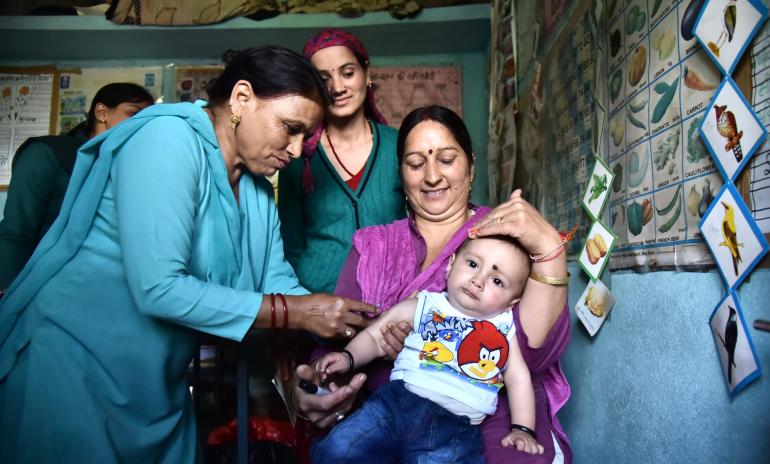
NEW DELHI – UNICEF India today released the agency’s global flagship report ‘The State of the World’s Children 2023: For Every Child, Vaccination,’ highlighting the significance of childhood immunization.
Based on new data collected by The Vaccine Confidence Project* (London School of Hygiene and Tropical Medicine) and published by UNICEF, the report reveals that popular perception of the importance of vaccines for children held firm or improved only in China, India and Mexico out of 55 countries studied.
While the vaccine confidence marks a decline in over a third of the studied countries, e.g., in the Republic of Korea, Papua New Guinea, Ghana, Senegal and Japan after the start of the pandemic. The report warns of the growing threat of vaccine hesitancy due to factors such as access to misleading information and declining trust in vaccine efficacy.
The decline in vaccine confidence globally comes amid the largest sustained backslide in childhood immunization in 30 years, fuelled by the COVID-19 pandemic. The pandemic interrupted childhood vaccination almost everywhere, especially due to intense demands on health systems, the diversion of immunization resources to COVID-19 vaccination, health worker shortages and stay-at-home measures.
“The State of the World’s Children 2023 report highlights India as one of the countries with the highest vaccine confidence in the world. This is a recognition of the Government of India’s political and social commitment and demonstrates that the #largestvaccinesdrive during the pandemic has paid off in building confidence and strengthening systems for routine immunization to vaccinate every child,” said Cynthia McCaffrey, UNICEF India Representative.
“Immunization is one of humanity’s most remarkable success stories, allowing children to live healthy lives and contribute to society. Reaching the last child with immunization is a key marker of equity that benefits not only the child but also the whole community. Routine immunizations and strong health systems can best prepare us in preventing future pandemics and reducing morbidity and mortality,” added McCaffrey
The Report warns a total of 67 million children missed out on vaccinations between 2019 and 2021, with vaccination coverage levels decreasing in 112 countries. In 2022, for example, the number of measles cases was more than double the total in the previous year. The number of children paralysed by polio was up 16 per cent year-on-year in 2022. When comparing the 2019 to 2021 period with the previous three-year period, there was an eight-fold increase in the number of children paralysed by polio, highlighting the need to ensure vaccination efforts are sustained.
Despite an increase in the number of zero-dose (unreached or missed out) children to three million – between 2020 and 2021 – during the pandemic, India was able to arrest the backslide and bring down the number to 2.7 million, which represents a smaller proportion of the India’s under -5 child population given its size and the world’s largest birth cohort. This achievement can be attributed to sustained evidence-based catch-up campaigns initiated by the government, including the Intensified Mission Indradhanush (IMI), continued provision of comprehensive Primary Health Care services, a strong Routine Immunization programme and dedicated health workers. Continued progress is being made to reach the last mile and the last child.
The pandemic also exacerbated existing inequities. For far too many children, especially in the most marginalized communities, vaccination is still not available, accessible or affordable. Even before the pandemic, progress on vaccination had stalled for almost a decade as the world struggled to reach the most marginalised children.
New data produced for the report by the International Center for Equity in Health found that in the poorest households, 1 in 5 children are zero-dose while in the wealthiest, it is just 1 in 20. It found unvaccinated children often live in hard-to-reach communities such as rural areas or urban slums. They often have mothers who have not been able to go to school and who are given little say in family decisions. These challenges are greatest in low- and middle-income countries, where about 1 in 10 children in urban areas are zero dose and 1 in 6 in rural areas. In upper-middle-income countries, there is almost no gap between urban and rural children.
